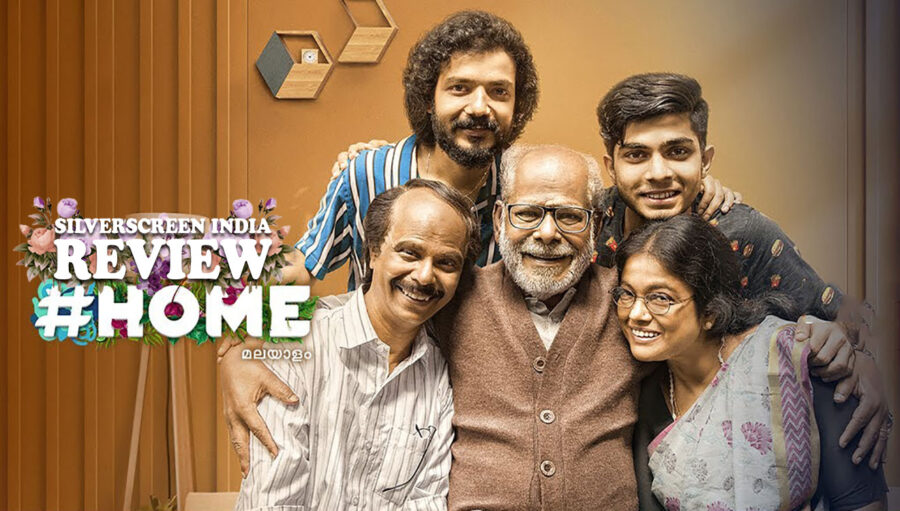A relentless and inept background score leads #Home, a Malayalam comedy-drama directed by Rojin Thomas. It is all-pervasive, dictating the viewer’s emotional response in every scene, drowning the characters in a mindless mush and turning the conflicts they face in everyday life into highly processed Instagram stories.
In one instance, the BGM is a piece of Twinkle Twinkle Little Star, a desperate reassertion that the film wants to tug on the viewer’s heartstrings.
Thomas, who made his debut eight years ago through Philips And The Monkey Pen, continues to pass fluff for quirk and sweetness. His films are closer, in texture and soul, to narrative ad films where human relationships are mediated and transformed by consumer products. In #Home, Oliver Twist (Indrans), a genial sexagenerian, feels left out in a world run by smartphones and social media. When he realises that his elder son Antony (Sreenath Bhasi), a successful film director, is ashamed of his old-fashioned low-brow father, Oliver decides to tame the elusive modern technology.
There must be numerous ways to narrate a story about the social isolation that elders face. Thomas uses the device of nostalgia and saccharine sentiment. Now and then, the film salutes the idea of home as a safe place directionless youngsters can run back to, where their old but spirited mother will do the chores and simplify the pains of their adulthood, and their father will affectionately oversee the smooth functioning of the household.
The house in #Home, despite the low economic status of the inhabitants, boasts modern architecture and gorgeous decor. The terrace has a flourishing garden. When shit hits the roof, rather than addressing the real issues driving Antony’s film career to an early death, the film relies on motivational speeches and miscellaneous beauty shots.
Characters are cardboard cut-outs embodying an idea – the parents are awkward but loving, the young sons lack a focus in life, Antony’s girlfriend (Deepa Thomas) is nagging and silly, but fiercely loyal. The lead characters transform but mildly, careful enough to not upset the balance of a traditional middle-class family, and arrive in a climax scene where laughter galore.
The son’s refusal to appreciate the father gets the treatment of a tragedy. The mother (Manju Pillai) being subjected to passive harassment – endless domestic labour – laughed over. When a superstar actor (Anoop Menon), a writer-academician (Sreekanth Murali), and a bearded psychologist with a quirky edge (Vijay Babu) enter, wearing an aura of wisdom and success, the viewers are expected to take notes.
Nothing in the initial parts of the film suggests that Oliver is a man without self-esteem. He needs some assistance in understanding his new smartphone, but it is not something his best friend (Johny Antony) cannot help him with.
For no real reason, the film inserts a long-drawn sequence where Oliver consults a psychologist who encourages him to practise Tai Chi while his assistant (Pauly Valsan) tutors him on the basics of social media and messaging applications. The movie stands still in this portion, refusing to engage with the central plot or entertain the viewer.
Similarly, the dinner scene in the end where the family’s inner turbulences come out in the open seems painstakingly dull and contrived; the characters behave as though they learned nothing from the proceedings until then. Oliver and the film blame smartphones for a generation’s inability to succeed in the career they choose. What if the problem isn’t the phone but Antony’s lack of talent or motivation?
The film solves Oliver’s crisis by granting him a heroic story, an elaborate flashback sequence filmed without any flourish or profoundness. It is a lazy way out. It might be foolish to try to solve the complex problem of ageism using the image of the old man as a spirited teenager.
Not many of Malayalam cinema’s great character artists have been lucky enough to grow old on the screen. Indrans, now in his sixties, dons roles that remind millennials of their parents, awkward and fragile, caught between memories and a reality where they have to squeeze themselves in.
In Monroe Island (2016), Veyil Marangal (2019) and here, in #Home, he portrays the anxieties of an average man in a place where he no longer has a grip. Indrans elevates Oliver several notches above the ‘believable’, turning him deeply personal, into a man who deserves not just the viewer’s sympathy but time and attention.
Recommended
He unsolicitedly walks into the caravan of a superstar actor, and he comes out as an adorable nuisance. Indrans, who built a career playing the fool in 90s Malayalam cinema, has an incredible grasp of the line that divides buffoonery and an accident. The former is meant to be laughed over, the latter to elicit responses that determine the onlooker’s core values.
Manju Pillai delivers a solid performance as his aide, the wife who tackles the unruly family members using a sarcastic tongue, and Naslen as the happy-go-lucky younger son. Other than these sturdy performances, #Home is a dull watch. All dressed up in colourful costumes, but there is nowhere to go.
*****
This #Home review is a Silverscreen original article. It was not paid for or commissioned by anyone associated with the movie. Silverscreen.in and its writers do not have any commercial relationship with movies that are reviewed on the site.



